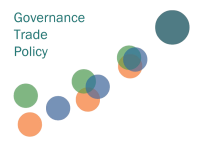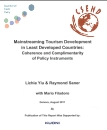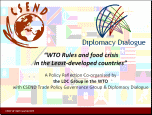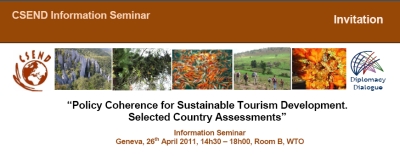TPG - categorys
 Through its Trade Policy and Governance Programme (TPGP), CSEND offers a new perspective and a new approach to trade policy governance that enables the recipient countries to better coordinate trade policy between their Ministries and to ensure effective trade policy consultation between the government and their respective economic and social partners.
Through its Trade Policy and Governance Programme (TPGP), CSEND offers a new perspective and a new approach to trade policy governance that enables the recipient countries to better coordinate trade policy between their Ministries and to ensure effective trade policy consultation between the government and their respective economic and social partners.
TPGP aims at improving governance mechanisms of key Ministries and Government Agencies that are responsible for the implementation of trade development mechanisms which have been agreed between industrialized and developing member countries of the WTO and of the International Financial Institutions such as the Enhanced Integrated Framework, Aid-for-Trade, TRTA and PRSP development instruments.
Lessons learnt from more than 20 years of trade capacity building will be made available upon request for DC and LDC governments. The advising and research activities of the CSEND-TPGP team will focus on strengthening LDC and DC governments capacities for inter-ministerial trade policy coordination and government-to-economic/social sector trade policy consultations of its trade, economic and social sector policies at the country level.
CSEND hopes to take TRTA to a next level and to be part of the international community's efforts towards building a new generation of trade development assistance and a new culture in the design, delivery and implementation of development activities directed to the DCs and to the LDCs. Such a reorientation will be ensure that the global trade agenda will indeed put development at the core of its deliberations and actions. Reference is often made of the WTO Doha Round being a development round. May it indeed become a negotiation round where development strategies will included in the global trade agreement which will be useful for the poor and for the least developed countries.
Alger, le 16 mai 2006, Prof. Dr Raymond Saner, Directeur, CSEND-Genève, Genève, le 20 mai 2006.Observations générales : Les participants étaient nombreux et les échanges entre intervenants et participants offraient d’excellentes opportunités de comparer concepts et stratégies visant à développer le secteur du tourisme de l’Algérie en particulier et des pays de la région en général.
Inclusion of Aid for Trade in Trade Policy Reviews: Strengthening Value of Development Instruments for LDCs (and developing countries) by Raymond Saner, Lichia Yiu and Mario Filadoro
TPRs can play a central role in mainstreaming trade into national development strategies. TPRs could be used to measure trade capacity gains of countries, a benefit from Aid for Trade (AfT) over time. To do so, it is important that TPRs become standardised in its methodology and reporting and the information pertaining to the Enhanced Integrated Framework (EIF) and other AfT investment be documented in the TPRs.
Teaching input for Executive Course on Global Health Diplomacy, The Global Health Programme, Graduate Institute, Univ. Geneva,
on 20th June 2012, Geneva. Title of Negotiation Simulation was: Negotiating Tobacco Control: Cross Border Advertisement, Promotion and Sponsorship: A Multi-Stakeholder Negotiation Simulation Exercise. Presentation on postmodern diplomacy and schedule of negotiations simulation are listed below
The Government Procurement Agreement (GPA) is the only legally binding agreement within the WTO covering government procurement (GP) guaranteeing fair and non-discriminatory conditions of international competition in GP. States usually spend around 15-25 % of GDP on GP. The GPA has 42 WTO members and the estimated value of markets open to competition is 1.6 trillion $/Year.
Seminar on GPA and GP
CSEND organized a seminar on GPA on 11th June in Geneva within the context of a graduate course taught by Professor Raymond Saner. Speakers at the seminar included Mr. Nicholas Niggli, Counsellor, Deputy Head of the WTO Division, Permanent Mission of Switzerland to the WTO & EFTA and Chairman, WTO Government Procurement Agreement; Mr. Junior Lodge, Technical Coordinator, WTO Negotiations, CARICOM Office of Trade Negotiations (OTN) and Mr. Robert Anderson, Counsellor, expert of GPA at WTO.
Enhancing Learning in Monitoring and Evaluation: Six Cases from Philanthropic Organizations Working in the Health Sector
This capstone contributes to the ongoing process of refining M+E in development assistance with a particular focus on M+E methods used by philanthropic organizations that fund health projects in low-income developing countries.
 Health M E Report FINAL (2012-2013)
Health M E Report FINAL (2012-2013)
The Doha Development Agenda (DDA) launched in 2001was supposed to achieve further trade liberalisation while at the same time taking into account the needs of developing countries. Ten years have passed since its inception. No end of the Round is in sight and the possibility of a full failure looms in the background.
The learning architecture which bridges the individual training on trade rules to upgrade trade institutional capacities: Three stages model of CSEND (published in Capacity Development, 2003, Note by the UNCTAD Secretariat, Trade and Development Board (TD/B/50/9, TD/B/WP/168)
Inputs made by Prof. Raymond Saner at the Trade Investment and Climate Change (TRI-CC): Searching for Progress in Key Areas on 13 October, 2011, Geneva, WHO Headquarters. This one-day event covered new research and thinking on green industrial policy, competitiveness and leakage, and the potential role of the trade community.
Raymond Saner & Laura Paéz, CSEND policy paper, June 2005.
In 2002, nearly 30 WTO members pledged more than 30 Million Swiss Francs to ensure the achievement of the Doha Development Round (DDR). The pledged amount is meant to finance 514 capacity building actives listed in the WTO Annual Technical Assistance Plan (TAP). In addition, support is to be extended to 49 Least Developed Countries (LDCs) though the Integrated Framework (IF), to help them integrate trade policy into their development strategies. Concerns have arisen as to the scope, effectiveness and efficiency of the TAP and IF. While the activities planned are laudable, the authors question whether they can be achieved and suggest a fundamental reassessment of TAP and IF in order to fulfill the objectives of the DDR.
Objective:
To give students insights into WTO, the WTO dispute settlement procedures and negotiations within the WTO multilateral context. The students are asked to analyse the negotiation process of concrete cases of disputes between WTO member states.
The role trade can play in development is highly debated, especially with regards to low income countries, which are perceived as not having the economic foundations to trade in the first place. Misperceptions are common in a field where economists, lawyers, social scientists and diplomats have views and interests that can be diverging. This course will consider a number of topics associated with Trade and Development, with a particular focus on the multilateral system and the role of low income countries in this system. Part of the course will be considering economic issues and the other part will focus on institutional issues.
Professor in Organisation and International Management (University of Basle)
Raymond Saner is the co-founder of CSEND, a Geneva based NGRDO (non-governmental research and development organisation, and the director of CSEND’s Diplomacy Dialogue branch.
According to a review of Bolivia's energy sector conducted last year by the Centre for Socio Eco-Nomic Development (CSEND), the most significant subsidies are centred on the country's hydrocarbon resources. The research concluded that subsidies are an inefficient way for Bolivians to benefit from the profits of hydrocarbon exploitation.
The 2010 World Investment Report " focuses focuses on trends in foreign direct investment (FDI) worldwide, at the regional and country levels and emerging measures to improve its contribution to development. The year's report, titled "Investing in a Low-Carbon Economy", discusses the opportunities and threats for developing countries in the transition to a low-carbon economy, and considers how foreign investment and transnational corporations can be leveraged in supporting this process.
"Beyond the crisis: The future of the multilateral system" - Seminar organized by the Foundation Ramón Areces and the OECD Development Centre
Madrid, 4-5 October 2010, ![]() Article
Article
Education plays a crucial role in fostering personal and social development, as well as economic growth. Government policies play a dominant role in this sector. Over time, trade in education services, particularly at the tertiary level, have been growing in importance. Driving factors include a combination of demographic changes, technological developments, national development goals, and governmental reforms to the funding and provision of higher education. The educational market has grown in size with more exporters entering the field to satisfy growing demand worldwide. The education sector today truly operates in a global context with institutions, programmes, and people supplying services across borders at an unprecedented scale.
 Tourism is a significant contributor to GDP, employment and to the international appreciation of a country and its culture – regardless of its level of development. This policy analysis seeks to assist the Least Developed Countries (LDCs) in harnessing development opportunities by providing a comprehensive overview of existing international development instruments, i.e., Diagnostic Trade Integration Studies (DTISs) and their Action Matrices, Poverty Reduction Strategy Papers (PRSPs), and reviewing their alignment with the national tourism development strategies, investment policies and tourism related trade arrangements.
Tourism is a significant contributor to GDP, employment and to the international appreciation of a country and its culture – regardless of its level of development. This policy analysis seeks to assist the Least Developed Countries (LDCs) in harnessing development opportunities by providing a comprehensive overview of existing international development instruments, i.e., Diagnostic Trade Integration Studies (DTISs) and their Action Matrices, Poverty Reduction Strategy Papers (PRSPs), and reviewing their alignment with the national tourism development strategies, investment policies and tourism related trade arrangements.
An Analysis of The Policy Framework for Investment in Infrastructure of The Kingdom of Lesotho and its Impact on Tourism-Related Infrastructure
A debate has sprung up on the Internet among economists and social scientists tracking the India story involving Jagdish Bhagwati , Amartya Sen, Martin Wolf and many others. The basic question is: Should India continued to focus exclusively on high growth or should it invest more in social programmes as well. In regard to development strategy, should trade and economic policy have the upper hand over social and political policy- or a mix of both with different time frames and priorities. At issue are the need to reduce high levels of poverty and equally high level of inequality.
Capstone 2010: Trade and Investment for developmen, here
Trade in Health services is part of the GATS/WTO service agreement. What follows describes health services in the context of offensive and defensive health service interest that countries might have.
GATS Financial Services Liberalization: How do OECD Members Schedules Impact Commercial Banking FDI?
Recent efforts to lay out an international regulatory framework relevant for fi nancial services liberalization, consolidated under the aegis of the World Trade Organization (WTO) and followed by the implementation of the General Agreement on Trade in Services (GATS), have provided market access to commercial banks seeking establishment in an important group of countries.
Regional Trade Agreements and Foreign Direct Investment: Impact of existing RTAs on FDI and trade flows in the Andean Community and implications of a hemispheric RTA in the Americas.
Hardly a day goes by without the media reporting on the difficult negotiations w i t h i n t h e Wo r l d Trade Organization (WTO) and the threat to international trade should there be no successful conclusion to the Doha Round.
The problem most often reported centers around market access for agricultural products from developing countries that cannot pass the prohibitively high level of tariffs of the industrialized countries.
This policy brief argues that, all too often, the Fund’s use of “conditionalities” for lending has stepped beyond its core legal mandate, particularly causing harm to the least developed countries’ economic development, for example by dictating their trade policies.
Technical Assistance to Least-Developed Countries in the Context of the Doha Development Round: High Risk of Failure
Summary Report of Book Vernissage “Inter-Ministerial Coordination and Stakeholder Consultation of Trade Policy Making” - 19th July, 2010 in Room C, WTO
CSEND-CUTS Book Vernissage 19th July 2010, WTO, Geneva “Inter-ministerial Coordination and Stakeholder Consultation of Trade Policy Making
![]() This joint panel between CSEND and CUTS offers key insights into how countries can improve their trade policy governance. Both are research and development NGOs and have conducted research, capacity building and networking projects in Africa, Asia and Latin America. The two organisations will present findings of their recent research on trade policy making processes and role of relevant stakeholders. They will also offer solution sets to participants interested in how trade policy governance can be organised in a more efficient, inclusive and effective manner.
This joint panel between CSEND and CUTS offers key insights into how countries can improve their trade policy governance. Both are research and development NGOs and have conducted research, capacity building and networking projects in Africa, Asia and Latin America. The two organisations will present findings of their recent research on trade policy making processes and role of relevant stakeholders. They will also offer solution sets to participants interested in how trade policy governance can be organised in a more efficient, inclusive and effective manner.
 CSEND has organized an international conference on the Food Crisis together with the group of the Least Developed Country members of the WTO. The title of the conference was“ WTO Rules and Food Crisis in the Least Developed Countries” . The conference took place on 17th July at the Geneva Centre for Security Policy in Geneva. The working programme including presentations and related documents are available here.”
CSEND has organized an international conference on the Food Crisis together with the group of the Least Developed Country members of the WTO. The title of the conference was“ WTO Rules and Food Crisis in the Least Developed Countries” . The conference took place on 17th July at the Geneva Centre for Security Policy in Geneva. The working programme including presentations and related documents are available here.”
Place: Geneva Centre for Security Policy
Programme click ![]() here
here
![]() The Financing for Development Office of the United Nations recently published an excerpt of Prof. Raymond Saner's ground breaking article on "The International Monetary Fund's Influence on Trade Policy: A Legal Critique" in its Newsletter, The Road to DOHA (link). The original article was published in the Journal of World Trade, 41(5): 931-981, 2007.
The Financing for Development Office of the United Nations recently published an excerpt of Prof. Raymond Saner's ground breaking article on "The International Monetary Fund's Influence on Trade Policy: A Legal Critique" in its Newsletter, The Road to DOHA (link). The original article was published in the Journal of World Trade, 41(5): 931-981, 2007.
This paper focuses on the function of Inter-ministerial Policy Coordination (IMPC) and its critical role in governance. Following a definitional section, the authors give an overview of public sector governance in Eastern & Central Europe and Central Asia and then discuss the application of governance principles to Inter-ministerial Policy Coordination in these regions. They conclude with specific examples from the Republic of Macedonia and Central_Asia.
